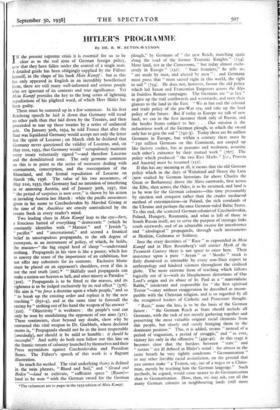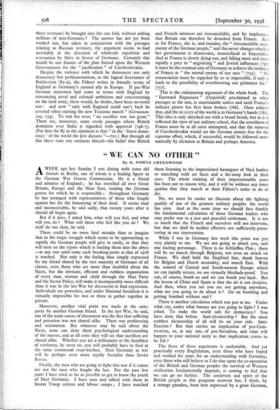HITLER'S PROGRAMME
By DR. R. W. SETON-WATSON
IN the present supreme crisis it is essential for us to be I dear as to the real aims of German foreign policy, now that they have fallen under the control of a single man.
A detailed guide has been obligingly supplied by the Fiihrer himself, in the shape of his book Mein Kampf : but as this has only appeared in English in an incredibly bowdlerised form, there are still many well-informed and serious people who are ignorant of its contents and true significance. Yet Mein Kampf provides the key to the long series of lightning repudiations of his plighted word, of which Herr Hitler has been guilty.
These must be summed up in a few sentences. In his first Reichstag speech he laid it down that Germany will tread no other path than that laid down by the Treaties, and then proceeded to tear up those treaties by a series of unilateral acts. On January 3oth, 1934, he told France that after the Saar was liquidated Germany would accept not only the letter but the spirit of Locarno ; on March 18th he declared that Germany never questioned the validity of Locarno, and, on May 21st, 1935, that Germany would " scrupulously maintain every treaty voluntarily signed "—and therefore Locarno and the demilitarised zone. The only germane comment on this is to point to the series of measures dealing with rearmament, conscription, and the reoccupation of the Rhineland, and the formal repudiation of Locarno on March 7th, 1936. The value of his two assurances, of May 2ISt, 1935, that Germany had no intention of interfering in or annexing Austria, and of January 3oth, 1937, that the period of surprises is now over," is shown by his action in invading Austria last March : while the pacific assurances given in his name to Czechoslovakia by Marshal Goring at the time of the Anschluss are crassly contradicted by the .vents fresh in every reader's mind.
Two leading clues in Mein Kampf leap to the eye—first, a ferocious hatred of everything " democratic " (which he constantly identifies with " Marxist " and " Jewish "), " pacifist " and " international," and second a fanatical belief in unscrupulous propaganda, to the nth degree of paroxysm, as an instrument of policy, of which, he holds, the masses—" the big stupid herd of sheep "—understand nothing. Propaganda in his view is like a poster, which has to convey the sense of the importance of an exhibition, but not offer any substitute for its contents. Exclusive blame must be placed on an opponent's shoulders, even if this is not the real truth (zoo).* " Skilfully used propaganda can make a nation see heaven as hell, and utter misery as Paradise " (302). " Propaganda is to be fitted to the masses, and its rightness is to be judged exclusively by its real effect " (376). His aim is "to force a doctrine upon a whole people," and so " to break up the existing order and replace it by the new teaching " (652-4), and at the same time to forestall the enemy by " striking out of his hand the weapon of his answer " (522). " Objectivity " is weakness : the people's soul can only be won by annihilating the opponent of our aims (371). These sentiments, dear beyond any doubt, show why he entrusted this vital weapon to Dr. Goebbels, whose declared motto is, " Propaganda should not be in the least respectable (anstondig), nor should it be mild or humble : it should be successful." And nobly do both men follow out this line on the frantic stream of calumny launched by themselves and their Press myrmidons against Czechoslovakia and President Benes. The Fiihrer's speech of this week is a flagrant illustration.
So much for method. The vital underlying theory is defined in the twin phrases, " Blood and Soil," and " Groud and Baden "-land to cultivate, " sufficient space " (Raum)— land *to be won " with the German sword for the German *The references are to pages in the x933 edition of Mein Kampf. plough," by Germans of " the new Reich, marching again along the road of the former Teutonic Knights " (154). More land, not in the Cameroons, " but today almost exclu- sively in Europe " (152). " State frontiers," he tells us, " are made by men, and altered by men " : and Germany must press that " most sacred right in this world, the right to soil " (754). He does not, however, favour the old policy which led Saxon and Franconian Emperors across the Alps in fruitless Roman campaigns. The Germans are " at last " to give up the trail southwards and westwards, and turn their glances to the land in the East. " We at last end the colonial and trade policy of the pre-War era, and take up the land policy of the future. But if today in Europe we talk of new land, we can in the first instance think only of Russia, and the border States subject to her. . . . Our mission is the industrious work of the German plough, to which the sword only has to give the soil " (742-3). Today there are 8o million Germans in Europe, but within a century there must be " 250 million Germans on this Continent, not cooped up like factory coolies, but as peasants and workmen, assuring each other's existence by their mutual work " (767). The policy which produced " the two East Marks " [i.e., Prussia and Austria] must be resumed (152).
If this has any meaning at all, it means that the old German policy which in the days of Widukind and Henry the Lion (now exalted by German historians far above Charles the Great or Barbarossa) drove the Slays eastwards, first across the Elbe, then across the Oder, is to be resumed, and land is to be won for the German colonists—this time presumably by ejection and conquest rather than the cruder mediaeval method of extermination—in Poland, the rich cornlands of the Ukraine and perhaps the once German-ruled Baltic States. To this end, the scattered German colonies of Czechoslovakia, Poland, Hungary, Roumania, and what is left of those in South Russia itself, are to serve the purpose of strategic links south eastwards, and of an admirable excuse for interference and " ideological " propaganda, through such instruments as Henlein, Codreanu or Szalassy.
Into the crazy doctrines of " Race " as expounded in Mein Kampf and in Herr Rosenberg's still crazier Myth of the Twentieth Century there is not space to enter here. Their insistence upon a pure " Aryan " or " Nordic " stock is flatly dismissed as untenable by every non-Nazi expert in anthropology and kindred sciences throughout the civilised globe. The more extreme form of teaching which follows logically out of it—with its blasphemous distortions of Our Lord's origin and its abuse of St. Paul as a " materialistic Rabbi," intolerant and responsible for " the first spiritual Terror "—may without exaggeration be described as incom- patible with the Christian religion, and is so regarded by all the recognised leaders of Catholic and Protestant thought.
" Race," none the less, is to be the basis of the German future : " the German Reich as State should include all Germans, with the task of not merely gathering together and preserving the most valuable original racial elements from this people, but slowly and surely bringing them to the dominant position." This, it is added, means " instead of a period of stagnation, a period of struggle," and " as ever, victory lies only in the offensive " (439-4o). At this stage it becomes clear that the borders between " state " and " nation " are ill defined in Hitler's mind : for almost in the same breath he very rightly condemns " Germanisation " or any other forcible racial assimilation, on the ground that you cannot make " a Teuton, say, out of a negro or a China- man, merely by teaching him the German language." Such methods, he argued, would come nearer to de-Germanisation than to Germanisation. How, then, we may ask, can all the many German colonies in neighbouring lands (still more those overseas) be brought into the one fold, without adding millions of non-Germans ? The answer has not yet been worked out, but taken in conjunction with the passages relating to Russian territory, the argument seems to lead inevitably in the direction of wholesale expulsion and evacuation by Slays in favour of Germans. Certainly this would be one feature of the plan foisted upon the Western Governments for the " pacification " of Czechoslovakia.
Despite the violence with which he denounces not only democracy but parliamentarism, as the logical forerunner of Bolshevism (85-9), the Fiihrer writes in friendly terms of England as Germany's natural ally in Europe. If pre-War German statesmen had come to terms with England by renouncing naval and colonial ambitions and concentrating on the land army, there would, he thinks, have been no world war : and now ".only with England could one's back be covered when starting the new Teutonic march " (Germanen- zug, 154). To win her over, " no sacrifice was too great." There arc, moreover, some crude passages where British dominion over. India is regarded with approval (746-7). (For him the fly in the ointment is that " in the ' freest demo- cracy ' of the world the Jew dictates "-721.) But through all this there runs one ominous thread—the belief that British and French interests are irreconcilable, and by implication that Britain can therefore be detached from France. And as for France, she is, and remains, the " irreconcilable arch- enemy of the German people," and this never changes whether her government is democratic, monarchical or Imperialist. And as France is slowly dying out, and falling more and more rapidly a prey to " negroising " and Jewish influences (73o) it must be the eventual aim of Germany to achieve the isolation of France as " the mortal enemy of our race" (755). " No renunciation must be regarded by us as impossible, if only it leads to the possibility of overthrowing our grimmest foe " (757). • This is the culminating argument of the whole book. The " Eastward Expansion " (Ostpolitik) proclaimed in other passages as the aim, is unattainable unless and until France's military power has first been .broken (766). Once achieve that, and the m: stery of the world is in Germany's hands (782). This idea is only sketched out with a broad brush, but in it is reflected the view of one military school, that the overthrow of France must be at all costs attempted, and that the removal of Czechoslovakia would set the German armies free for the supreme effort, which, if successful, would be followed auto- matically by dictation to Britain and perhaps America.















































 Previous page
Previous page